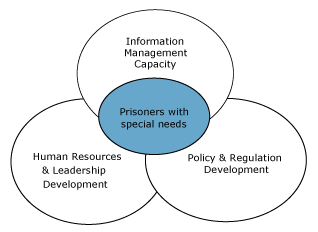Assisting the process of prison reform in Sudan
Over two decades of civil war in Africa's largest country has destroyed much of the infrastructure including courts and prisons. The impact of war has been severe and the Government of Southern Sudan (GoSS) now faces the challenge of rebuilding institutions, which have been largely destroyed during the war.
In partnership with the United Nations Mission in Sudan (
UNMIS ) and in cooperation with the International Centre for Criminal Law Reform and Criminal Justice Policy (ICCLR), the United Nations Office on Drugs and Crime (UNODC) has developed a programme to strengthen the institutional capacity of the Southern Sudan Prison Service (SSPS) and improve its ability to meet international human rights standards as part of the overall development of the criminal justice system.
Phase I Prison Reform
Acknowledging the need for reestablishing rule of law institutions, a specific requirement has been identified by the GoSS for assistance in rebuilding the capacity of prison management to lead the process of reform. Initial UNODC activities seek to address this need and meet the request for assistance in working together with the Government to achieve sustainable reform and development of an effective criminal justice system which adheres to international standards and norms. In December 2007 at the invitation of GoSS, the UNODC in partnership and in cooperation with UNMIS Corrections Advisory Unit began the first phase of a project in assisting the process of prison reform.
Key elements of Phase 1

Phase 1 Activities
Continuing Prison Reform
While the achievements of Phase I are vast and notable, there is an urgent need to continue the reform efforts in improving institutional capacity, providing infrastructure, equipment and the training of a professional cadre to ensure humane incarceration and rehabilitation of inmates. Thus, while the activities under Phase I have begun, the process of strengthening the institutional capacity of the Prison Service and introducing training of officers, there is still much work required in order to provide for a system which adheres to the rule of law and is both respected and supported by police, government and the community.
Building upon the successes and achievements of Phase I and at the request of both UNMIS and the Southern Sudan Prison Service, a second phase of the project is beginning to be developed. The second phase expands the scope of reform by addressing new elements identified under the initial phase.
As Phase I clearly illustrated, the partnership with UNODC and UNMIS and ICCLR have been well received by the GoSS, the Prison Service and the general community. Phase II therefore seeks to build on the enthusiasm of the senior management of the Prison Service and GoSS to engage in sustained reforms.
The objectives of Phase II involve:
 Building a leadership cadre; Building a leadership cadre;
 Developing management and information systems; Developing management and information systems;
 Developing laws, policies and standing orders to support reforms; Developing laws, policies and standing orders to support reforms;
 Ensuring lawful detention and adherence to the rule of law; Ensuring lawful detention and adherence to the rule of law;
 Improving the well being of vulnerable groups of prisoners; and Improving the well being of vulnerable groups of prisoners; and
 Improving prison conditions and prisoner health. Improving prison conditions and prisoner health.
Conclusion
By achieving these reform objectives, the project will contribute to the Government of Southern Sudan's efforts to rebuild its correctional system and bring it into conformity with internationally recognized minimum standards. By so doing, the project will promote the rule of law and the establishment of an efficient, effective and humane criminal justice system.
Real life stories from the field
UNODC wishes to acknowledge the support of the Government of Canada in funding Phase I of this project.
|

 It is not the uniform one wears which is important as a prison officer, but rather it is the knowledge an officer acquires and how such knowledge is used It is not the uniform one wears which is important as a prison officer, but rather it is the knowledge an officer acquires and how such knowledge is used

Prison Service Director General
Agasio Akol Tong

Southern Sudan prison staff at Lologo

Prisoners in Juba women's Prison

Inside a prison in Sudan

Juba women's prison

Southern Sudan prison staff at Lologo
|